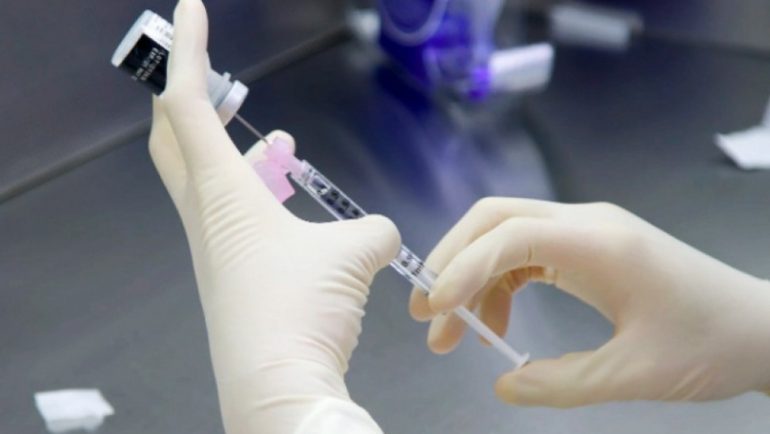Preliminary observations of the first phase of a study conducted in Cyprus, as announced by the Biobank.cy Center for Excellence in Biobank.cy and Biomedical Research of the University of Cyprus, show that the levels of antibodies after vaccination against SARS-CoV-2 with first and second dose , rise much higher compared to those of those who became ill, while again the levels fall in a few months after the second dose.
This research is ongoing and the call is open to vaccinated volunteers to monitor their antibodies over time.
According to a press release of the University of Cyprus, the Center for Excellence Biobank and Biomedical Research biobank.cy of the University of Cyprus, announced the results of the first phase of a study for antibodies against COVID-19 in the population of Cyprus, during which the titer of IgG antibodies against SARS-CoV-2 was analyzed by qualitative and quantitative method. "The results show that older people (> 60 years), men and people who have had symptoms or been treated are more likely to achieve higher IgG antibody titers," it said.
The antibody response to SARS-CoV-2 infection, it is added, peaks in the first trimester and then drops sharply to the first half of the year and stabilizes and / or decreases after 6 months.
It is reported that PK coordinates research with collaborators from the Medical School of the University of Cyprus, the Medical School of the University of Nicosia and the School of Sciences of the European University of Cyprus with various objectives, including the control and evaluation of the presence of antibodies against COVID-19, in the population of Cyprus.
It is noted that this is perhaps the first study of its kind conducted among the Cypriot population and published in a peer-reviewed journal, which provided the opportunity to study various factors that may affect the levels of anti-coronavirus antibodies.
According to the press release in the first phase, the research aimed to test for the presence of antibodies against the coronavirus SARS-CoV-2, which is responsible for COVID-19. People who were positively diagnosed with coronavirus, health professionals from the General Hospital of Nicosia, Makareio Hospital of Nicosia and the General Hospital of Paphos and people from the general population were invited to participate as volunteers in the research, to give samples of biological material.
The results so far, which are being published as an original work in the Journal of Clinical Medicine, concern 1.898 volunteers from Cyprus.
The study collects genetic DNA, plasma, serum and urine of volunteers.
"In the present phase, the titer of IgG antibodies against SARS-CoV-2 was analyzed by qualitative and quantitative method. "The results show that older people (> 60 years), men and people who have had symptoms or been treated are more likely to achieve higher IgG antibody levels."
The antibody response to SARS-CoV-2 infection peaks in the first trimester and drops sharply thereafter to the first half and stabilizes and / or decreases after 6 months.
According to the press release, preliminary observations not included in this publication show that antibody levels after vaccination with the first and second dose rise much higher than those of those who became ill, while again the levels fall in a few months. after the second dose.
"These first observations agree with similar observations of other scientists in different populations and reinforce the view and correctness of the decision for a third booster dose of the vaccine. "Studies by scientists from other countries have shown that, although there is no absolute correlation, it is observed that antibody levels reflect to some extent the body's immune adequacy," the study said.
According to the press release, this study was also revealing in terms of the willingness and interest of the Cypriot citizen, on the one hand to learn how his body reacted to the infection with COVID-19 and in vaccination, and on the other hand to share with the research team clinical data and biological material for further studies.
"Our team emphasizes that vaccination is the best method of protection against it COVID-19"both on a personal level and on a family and wider social level", it is noted.
It is added that the fact that the coronavirus is still mutating and that the booster dose becomes necessary is not an excuse to avoid vaccination, but rather shows that more vaccination coverage is needed in the population and that protection measures continue to be applied.
"We hope that in the near future we will have other documented results that will allow us to announce useful results, utilizing the wealth of data and biological material collected at the Biobank," the press release states.
This research is ongoing and the call is open to vaccinated volunteers to monitor their antibodies over time.
Individuals who have taken the third installment and wish to participate in the research study, are invited to contact the Biobank of the University of Cyprus 15-30 days after the supportive third installment, by phone: 22-892815 or via the website: https: // biobank .cy / erevna-covid-19/. The test for antibody detection in the population is free.
The study is carried out in the framework of the H2020-CY-Biobank program, funded mainly by the European Commission, the Republic of Cyprus and the University of Cyprus (Grant Agreement Number 857122), and partly by the Chinese Embassy and the organization "Cyprus Volunteer Doctors". Finally, as mentioned in the press release, the research team expresses its sincere thanks to the Cypriot volunteers and to the donors.
